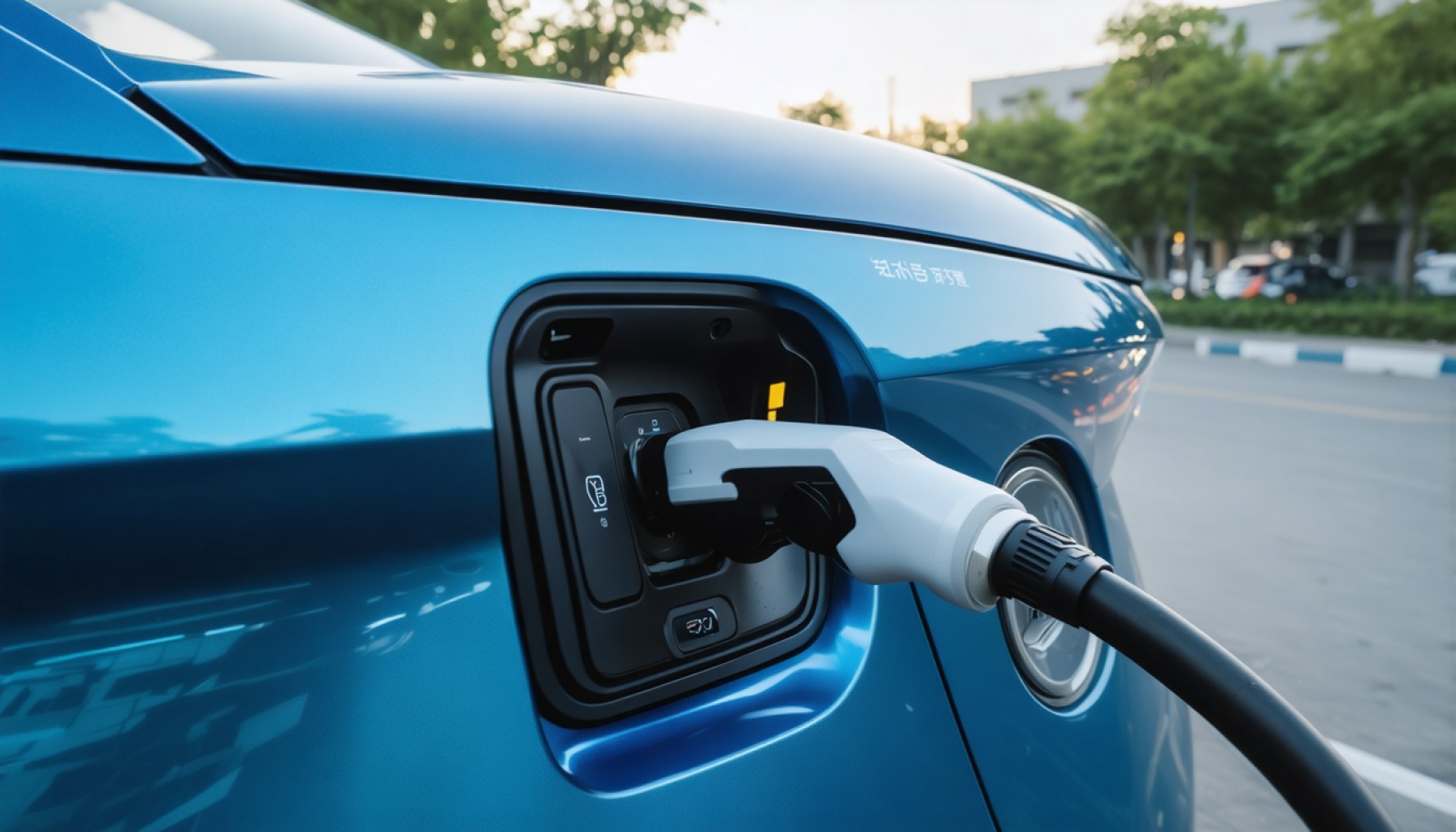
- BYD, China’s leading EV manufacturer, unveiled an ultra-fast charging system capable of delivering a 400 km range in just five minutes.
- The company is expanding rapidly with plans to establish over 4,000 high-tech charging stations across China using 1 megawatt chargers powered by advanced silicon carbide chips.
- BYD’s innovations are setting a new industry standard, prompting notable responses from competitors like Tesla, which has integrated BYD’s Blade battery technology.
- Despite some criticism in JD Power’s quality study, BYD’s production surged over 41% last year, and it has overtaken Tesla in battery-powered vehicle production with 1.78 million units.
- BYD’s strategy underlines the importance of rapid adaptation and innovation in the evolving EV landscape, significantly reducing charging anxiety for potential EV buyers.
At a motor show in Munich, the innovative spirit of China’s auto industry shone brightly as BYD, the country’s largest EV maker, introduced a groundbreaking ultra-fast charging system. Imagine pulling into a charging station, plugging in your car, and in the blink of an eye, it’s ready to hit the road with a range of 400 kilometers. This vision is swiftly becoming reality, thanks to BYD’s pioneering technology.
The Power of Innovation
BYD, short for “Build Your Dreams,” has transformed from a battery manufacturing marvel into a global automotive powerhouse. In a spectacular leap, they’ve unveiled a flash-charger that can fully replenish the latest EVs in as little as five minutes—a mere heartbeat in the world of electric vehicles. This breakthrough edges electrification ever closer to the ease and speed of traditional refueling, fundamentally addressing the most significant concern of potential EV owners: charging times.
Charging Ahead
The company’s ambitious plans involve rolling out over 4,000 high-tech charging stations across China. These stations feature 1 megawatt chargers powered by the advanced silicon carbide power chips developed by BYD, operating at extraordinary voltage levels of up to 1,500V. Such advancements promise not just speed, but safety and efficiency, vital factors that have earned these chargers high praise, with even Tesla opting to integrate BYD’s Blade lithium-ion phosphate battery technology into some of its models.
A Shockwave Across the Industry
This announcement reverberated through the EV landscape, jostling the giants, with Tesla’s stock dipping noticeably. Last year, BYD’s “new energy vehicles” surged 41% in production, amassing over 4.3 million units. Bold moves in pricing complement these tech strides, appealing to a broad audience with premium models like the Han L and Tang L, while also offering budget-friendly options like the Seagull at just $12,000.
However, no innovation is without its caveats. Despite their roaring sales, BYD’s Seal and Song Plus models faced criticism in JD Power’s 2024 China New Energy Vehicle Initial Quality Study. Yet, even critics can’t deny the energy BYD has infused into the EV race, as it overtakes Tesla in sheer production numbers, reporting 1.78 million battery-powered vehicles.
The Road Ahead
BYD’s aggressive expansion and innovation provide a key lesson for the industry: The future belongs to those who adapt quickly and innovate relentlessly. While charging anxiety has long been a stumbling block for electric vehicles, BYD’s advancements represent a pivotal stride towards a more electrified, sustainable transportation future. Whether it’s swift charging or strategic market expansion, BYD sets a pace that others may struggle to match.
Revolutionizing EV Charging: The BYD Ultra-Fast Charger and Its Impact on the Auto Industry
Introduction: BYD’s Groundbreaking Ultra-Fast Charging Technology
BYD, an acronym for “Build Your Dreams,” has unveiled an ultra-fast EV charging system at a motor show in Munich, poised to transform the industry. Imagine charging your electric vehicle (EV) in just five minutes, enabling a range of 400 kilometers. This remarkable feat addresses a critical concern for potential EV owners: extended charging times, moving closer to the convenience levels of traditional fueling.
As electric vehicles become a cornerstone of the automotive world, BYD’s drive to innovate is reshaping perceptions and expectations. Here are some additional insights into the technology and its implications.
Technical Insights: What Makes BYD Chargers Unique?
1. Silicon Carbide Power Chips: These chips significantly increase the efficiency and speed of the charging process by operating at high voltage levels up to 1,500V. This innovation enhances power flow and reduces the time needed to charge.
2. 1 Megawatt Charging Stations: These high-capacity stations deliver immense power to the battery, facilitating ultra-fast charging speeds that bring EV refueling times closer to traditional fueling experiences.
3. Blade Lithium-Ion Phosphate Battery: BYD’s batteries, known for their safety and long life, are also used by Tesla, underscoring their reliability and performance advantages.
The Global Implications and Industry Trends
BYD’s charging technology is not just a leap for China but offers lessons globally as automakers grapple with customer demand for faster charging solutions. Here’s a look at the broader implications:
1. Impact on Global EV Adoption: Faster charging times are a critical component in accelerating global EV adoption, making EVs more practical for consumers, especially in regions with sprawling road networks.
2. Market Forecasts and Competition: BYD’s charging technology is likely to spur other manufacturers to innovate, pushing the industry towards widespread adoption of high-performance charging infrastructure to stay competitive.
3. Sustainability Opportunities: With efficient charging comes reduced energy consumption and a lighter environmental footprint. BYD’s technology promises to complement global sustainability goals by making EV usage even more eco-friendly.
Pros and Cons of BYD’s Charging System
– Pros:
– Unparalleled charging speed
– Wide range of vehicle compatibility
– Support for high-powered EVs
– Potentially lower energy costs over time
– Cons:
– High initial infrastructure costs
– Requires extensive grid support and upgrades
– Potential for inconsistent performance in older models
Challenges and Critiques
While BYD charges forward, some challenges persist:
– Quality Concerns: BYD’s Seal and Song Plus models have faced initial quality critiques, highlighting the balance between innovation speed and consistent quality standards.
– Market Price Balancing: Balancing technology advancements with accessible pricing remains a crucial task for BYD to broaden its reach beyond well-equipped urban areas.
Strategic Recommendations for BYD
1. Expand Infrastructure: Prioritize strategic partnerships with international infrastructure providers to expedite the rollout of charging stations globally.
2. Enhance Quality Control: Strengthen quality assurance processes to maintain high standards as production scales.
3. Educational Campaigns: Educate consumers on the benefits and proper usage of advanced charging technologies to mitigate range anxiety and maximize adoption.
Conclusion: The Path Forward with BYD Chargers
BYD’s ultra-fast charging technology highlights the transformative power of innovation in the EV industry. By dramatically reducing charging times, BYD not only mitigates one of the major barriers to EV adoption but also cements itself as a technological leader. As the world embraces a more electrified future, BYD’s advancements serve as a beacon for other companies aiming to compete in this fast-evolving arena.
For more information on BYD and their latest innovations, visit BYD.
Quick Tip: For EV owners, planning trips around fast charging stations can save significant time, making long-distance travel more feasible and enjoyable with your electric vehicle.



